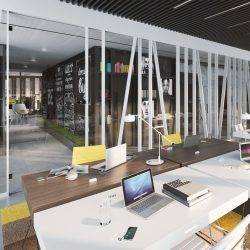November 14, 2017
Only one fifth of workers see AI as a threat to their jobs
 Only a fifth of workers see artificial intelligence as a threat to their jobs according to a new report. Over a third of male workers (39 percent) feel artificial intelligence (AI) and automation will make them better at tackling day-to-day tasks, in contrast to less than a quarter of female workers (24 percent). This gender gap in attitudes and expectations towards AI in the workplace is revealed in a report released by TalkTalk Business with research conducted by YouGov. This stands in stark contrast to a recent prediction by thinktank, Reform, which said that 250,000 public sector administrative jobs could be at risk by 2030 because of automation. Key decision makers surveyed were alert to the sweeping changes ahead, with 47 percent explaining that their companies intend to upskill their workforces to understand and utilise these newer technologies.
Only a fifth of workers see artificial intelligence as a threat to their jobs according to a new report. Over a third of male workers (39 percent) feel artificial intelligence (AI) and automation will make them better at tackling day-to-day tasks, in contrast to less than a quarter of female workers (24 percent). This gender gap in attitudes and expectations towards AI in the workplace is revealed in a report released by TalkTalk Business with research conducted by YouGov. This stands in stark contrast to a recent prediction by thinktank, Reform, which said that 250,000 public sector administrative jobs could be at risk by 2030 because of automation. Key decision makers surveyed were alert to the sweeping changes ahead, with 47 percent explaining that their companies intend to upskill their workforces to understand and utilise these newer technologies.










 Most private sector workers are still not pushing for pay rises, despite falling real wages and low unemployment, according to the latest quarterly CIPD/The Adecco Group Labour Market Outlook survey. Only a quarter (24 percent) of employers in the private sector say they are under some or significant pressure to raise wages from the majority of their workforce, while almost four in ten private sector firms (38 percent) say they face no pressure at all to raise wages. The most common reason given by private sector employers (23 percent) for the lack of pressure to raise wages is a recognition among workers that the business cannot afford more generous pay increases, underlining the productivity challenge many firms face. The survey of more than 2,000 UK employers shows a slightly higher proportion of private sector employers (36 percent) cite either some or significant pay pressure to raise wages for certain roles, particularly among high and middle-skilled jobs.
Most private sector workers are still not pushing for pay rises, despite falling real wages and low unemployment, according to the latest quarterly CIPD/The Adecco Group Labour Market Outlook survey. Only a quarter (24 percent) of employers in the private sector say they are under some or significant pressure to raise wages from the majority of their workforce, while almost four in ten private sector firms (38 percent) say they face no pressure at all to raise wages. The most common reason given by private sector employers (23 percent) for the lack of pressure to raise wages is a recognition among workers that the business cannot afford more generous pay increases, underlining the productivity challenge many firms face. The survey of more than 2,000 UK employers shows a slightly higher proportion of private sector employers (36 percent) cite either some or significant pay pressure to raise wages for certain roles, particularly among high and middle-skilled jobs.



 There are ongoing dual narratives in UK economy caused by the 2016 Brexit vote, the latest Morgan McKinley October Employment Monitor suggests. On the one hand, a new report by Colliers International dubbed London Europe’s top economic City. On the other hand, institutions are stubbornly stuck in limbo, and the fear of major jobs losses looms thick in the sky, keeping hiring low. “The economic tug of war that Brexit kicked off means we still have no idea quite where we’ll land,” said Hakan Enver, Operations Director, Morgan McKinley Financial Services. October was the lowest jobs month of 2017, a possible indication that the closing months of the year will be especially quiet. Job seekers increased by 6 percent month-on-month, but were down just under 40 percent year-on-year. The trajectories are in line with the overall dual trends of 2017. Jobs available were down 14 percent month-on-month and 20 percent year-on-year. Given the underlying health of the economy, Brexit looks to be the main culprit for the job market attrition.
There are ongoing dual narratives in UK economy caused by the 2016 Brexit vote, the latest Morgan McKinley October Employment Monitor suggests. On the one hand, a new report by Colliers International dubbed London Europe’s top economic City. On the other hand, institutions are stubbornly stuck in limbo, and the fear of major jobs losses looms thick in the sky, keeping hiring low. “The economic tug of war that Brexit kicked off means we still have no idea quite where we’ll land,” said Hakan Enver, Operations Director, Morgan McKinley Financial Services. October was the lowest jobs month of 2017, a possible indication that the closing months of the year will be especially quiet. Job seekers increased by 6 percent month-on-month, but were down just under 40 percent year-on-year. The trajectories are in line with the overall dual trends of 2017. Jobs available were down 14 percent month-on-month and 20 percent year-on-year. Given the underlying health of the economy, Brexit looks to be the main culprit for the job market attrition.






 Office rents have begun to slip across Central London, and the chief reasons could be uncertainty around the outcome of the Brexit talks and the UK seemingly missing out on the rising level of global trade, suggests Cluttons’ London Office Market Bulletin Autumn 2017. While the report highlights that many locations in Central London have seen headline office rents hold steady for the better part of two years, rent free periods have been moving out in order to sustain this, but now appear to be at a critical tipping point, level, which is driving some landlords to consider alternative incentives, such as delayed completions. Freddie Pritchard-Smith, Head of commercial office agency at Cluttons said: “Many firms remain nervous about making a long-term commitment to more space, choosing either flexible overflow space or to reconfigure within their existing office. The exception to this of course remains the serviced office and TMT sectors, who have helped transactional levels in the West End to surpass 4 million sq ft already this year, which is paradoxical to the falling rental conditions.”
Office rents have begun to slip across Central London, and the chief reasons could be uncertainty around the outcome of the Brexit talks and the UK seemingly missing out on the rising level of global trade, suggests Cluttons’ London Office Market Bulletin Autumn 2017. While the report highlights that many locations in Central London have seen headline office rents hold steady for the better part of two years, rent free periods have been moving out in order to sustain this, but now appear to be at a critical tipping point, level, which is driving some landlords to consider alternative incentives, such as delayed completions. Freddie Pritchard-Smith, Head of commercial office agency at Cluttons said: “Many firms remain nervous about making a long-term commitment to more space, choosing either flexible overflow space or to reconfigure within their existing office. The exception to this of course remains the serviced office and TMT sectors, who have helped transactional levels in the West End to surpass 4 million sq ft already this year, which is paradoxical to the falling rental conditions.”














November 10, 2017
Warnings of widening gender pay gap as women are hit hardest by low pay
by Sara Bean • Comment, Flexible working, News, Wellbeing, Workplace
It is Equal Pay Day today (Friday 10th November) – the day in the year which is marked in the calendar as the one where women start to work for free, and the campaigning charity the Fawcett Society has warned that the pay gap is actually widening for some groups of women and will now take 100 years to close, based on the current rate of change. Research by the Living Wage Foundation published to mark the day has also revealed women are hit hardest by low pay in the UK. Women make up nearly two thirds (62 percent) of workers currently struggling to make ends meet on less than the real Living Wage claims the Foundation, which amounts to 3.4 million women compared to 2.1 million men. Nearly 1/3 of all UK working women (26 percent) are still earning less than the Living Wage, compared to just 16 percent of all working men. And this trend has been the case since 2011, when KPMG and the Living Wage Foundation launched its annual Living Wage report.
More →